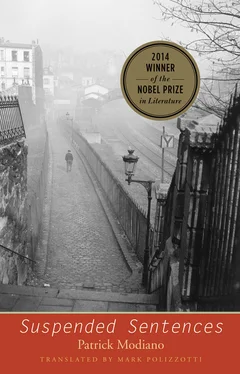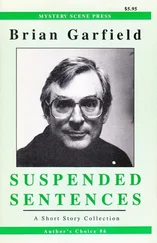“Oh … It’s you, Patoche …”
She was pacing back and forth beneath the plane trees in the schoolyard, with the principal of the Jeanne d’Arc school. The principal had told me to wait for them in the yard while they talked. My schoolmates had gone back to class when the bell had rung at five minutes to two, and I watched them, there, behind the panes of glass, sitting at their desks, without me. I tried to hear what the two women were saying, but I didn’t dare go any nearer to them. Annie was wearing her old leather jacket over a man’s shirt.
And then she walked away from the principal and came up to me. The two of us went out through the little doorway cut into the wall, which led to Rue du Docteur-Dordaine.
“Poor Patoche … They’ve expelled you.”
I felt like crying, but when I looked up at her, I saw she was smiling. And that made me feel relieved.
“You’re a bad student … like me …”
Yes, I was relieved that she wouldn’t scold me, but all the same I was surprised that this event, which seemed so serious to me, made her smile.
“Don’t you fret, old Patoche … We’ll find you another school.”
I don’t think I was a worse student than anyone else. The principal of the Jeanne d’Arc school had no doubt gathered information about my family. She must have realized Annie was not my mother. Annie, Little Hélène, Mathilde, and even Snow White: curious family … She must have feared I’d set a poor example for my little schoolmates. What could she have had against us? First, Annie’s lie. It must have caught the principal’s attention right from the get-go: Annie looked younger than her age, and it might have been better if she’d claimed to be my older sister. And then her worn leather jacket and especially those faded blue jeans, which were so unusual at the time … Nothing to hold against Mathilde: a typical old woman, with her dark clothes, corsage, cameo, and Nîmes accent. On the other hand, Little Hélène sometimes dressed strangely when she took us to Mass or the village shops: riding breeches with boots, blouses with puffy sleeves drawn tight at the wrists, black ski pants, or even a bolero jacket encrusted with mother-of-pearl … You could tell what her former occupation had been. And yet, the news dealer and the baker seemed fond of her, and always addressed her with respect:
“Good afternoon, Mademoiselle Toch … Good-bye, Mademoiselle Toch … What shall it be for Mademoiselle Toch today …?”
And what could one hold against Snow White? Her silence, black bun, and transparent eyes commanded respect. The principal of the Jeanne d’Arc school surely wondered why that girl came to fetch me after school, instead of my mother; and why I didn’t just go home by myself, like my other little friends. She must have thought we were rich.
Who knows? All the principal had to do was lay eyes on Annie for her to distrust us. Even I, one evening, had overheard a few bits of conversation between Little Hélène and Mathilde. Annie hadn’t got back from Paris yet in her 4CV and Mathilde seemed anxious.
“I wouldn’t put anything past her,” Mathilde had said, looking pensive. “You know as well as I do what a hothead she is, Linou.”
“She wouldn’t do anything really serious,” Little Hélène had said.
Mathilde had remained silent a moment, then said:
“You know, Linou, you keep some mighty peculiar company …”
Little Hélène’s face had grown hard.
“Peculiar? What’s that supposed to mean, Thilda?”
She’d spoken in a harsh voice I’d never heard from her before.
“Don’t get mad, Linou,” Mathilde had said, sounding scared and docile.
This was not the same woman who called me “blissful idiot.”
As of that moment, I realized that Annie, during her absences, did not always spend her time crying all night long at Carroll’s. She might have been doing something really serious. Later, when I asked what had happened, they told me, “Something very serious,” and it was like an echo of the sentence I’d previously heard. But that evening, the expression “hothead” was what worried me. Whenever I looked at Annie’s face, all I saw was affection. Could there have been a hothead lurking behind those limpid eyes and that smile?
I was now a pupil at the town public school, a bit farther away than Jeanne d’Arc. You had to follow Rue du Docteur-Dordaine to the end and cross the road that descended toward the town hall and the grade crossing. A large iron double gate led to the recess yard.
Here, too, we wore gray smocks, but the yard wasn’t paved with slag. It was just dirt, plain and simple. The teacher liked me and every morning asked me to read a poem to the class. One day, Little Hélène came to fetch me, instead of Snow White. She was wearing her riding breeches, boots, and a jacket that I called her “cowboy jacket.” She shook the teacher’s hand and told him she was my aunt.
“Your nephew reads poetry very well,” the teacher had said.
I always read the same one, the one my brother and I knew by heart:
Oh how many sailors, how many captains …
I had some good friends in that class: the son of the florist on Rue du Docteur-Dordaine; the pharmacist’s son, and I remember the morning when we learned his father had hanged himself; the son of the baker at the Food Hamlet, whose sister was my age and had blond, curly hair that fell to her ankles.
Often Snow White didn’t come to fetch me: she knew I’d come home with the florist’s son, whose house was next door to ours. When school got out, on afternoons when we didn’t have any homework, a group of us would go to the other end of town, past the chateau and the train station, all the way to the large water mill, on the banks of the Bièvre. It was still operational, and yet it looked dilapidated and abandoned. On Thursdays when Frede’s nephew wasn’t there, I’d bring my brother. It was an adventure we had to keep secret. We slipped through the gap in the surrounding wall and sat on the ground, side by side. The huge wheel turned round and round. We could hear the rumbling of a motor and the roar of the waterfall. It felt cool here, and it smelled like water and wet grass. The huge wheel gleaming in the half-darkness frightened us a bit, but we couldn’t help watching it turn, sitting side by side, arms hugging our knees.
My father would visit between trips to Brazzaville. He didn’t drive, and since someone had to bring him from Paris to our town, his friends would pick him up by turns: Annet Badel, Sasha Gordine, Robert Fly, Jacques Boudot-Lamotte, Georges Giorgini, Geza Pellmont, fat Lucien P., who would sit on an armchair in the living room, and each time we were afraid the chair would collapse or split beneath him; Stioppa de D., who wore a monocle and a fur coat, and whose hair was so thick with pomade that it left stains on the couches and walls against which Stioppa leaned his neck.
These visits occurred on Thursdays, and my father would take us out to lunch at the Robin des Bois inn. Annie and Little Hélène were out. Mathilde stayed home. Only Snow White would come to lunch with us. And sometimes Frede’s nephew.
My father had been a regular at the Robin des Bois a long time ago. He talked about it during one of our lunches with his friend Geza Pellmont, and I listened in on their conversation.
“You remember?” Pellmont had said. “We used to come here with Eliot Salter …”
“The chateau’s in ruins,” my father had said.
The chateau was at the end of Rue du Docteur-Dordaine, across from the Jeanne d’Arc school. Attached to the half-open gate was a rotting wooden sign, on which one could still read, “Property commandeered by the U.S. Army for Brigadier General Frank Allen.” On Thursdays we’d slip between the panels of the gate. The overgrown field of grass came to our waists. At the far end rose a Louis XIII — style chateau, its façade flanked by two detached houses standing forward from it. I later learned that it had been built at the end of the nineteenth century. We flew a kite in the field, a kite made of blue-and-red canvas and shaped like an airplane. We had a hard time getting it to soar very high. Farther on, to the right of the chateau, was a knoll with pine trees, and a stone bench on which Snow White sat. She read Noir et Blanc or else did her knitting, while we climbed into the pine branches. But we got dizzy, my brother and I, and only Frede’s nephew made it to the top.
Читать дальше












